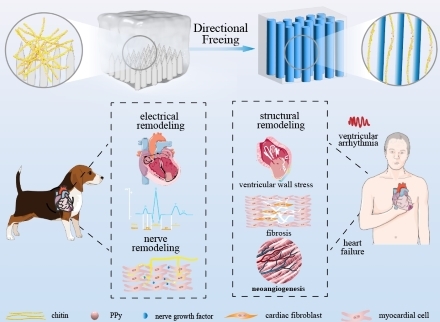Final ID: MDP803
Anisotropic conductive hydrogel reduces the incidence of major adverse cardiac events in a beagle model of myocardial infarction
Abstract Body (Do not enter title and authors here): Background
The main adverse cardiac events after myocardial infarction (MI), including ventricular arrhythmia and heart failure, have an important impact on the survival rate and long-term prognosis of patients with MI. Hydrogel patch is a promising treatment method, but it has some disadvantages such as low bionic performance.
Research Questions
The purpose of this proof-of-concept study was to investigate the cardiac protection potential of PPy-chitin hydrogels in beagle models of MI.
Methods
In beagle MI models, body surface electrocardiogram and event-related potential were used to evaluate cardiac electrophysiology. Induced arrhythmias was assessed by programmed electrical stimulation. Transthoracic echocardiography was used to evaluate left ventricular function.
Results
PPy-chitin hydrogel reduced the resistivity of infarct tissue (MI vs PPy, 3.36 vs. 1.67KΩ . cm, P<0.01), improved electrical conduction(QT interval, 360.67 vs. 298.63ms, P<0.01), and rebalanced the cardiac autonomic nervous system(low frequency /high frequency, 1.03 vs. 0.51, P<0.01). PPy-chitin hydrogel improved left ventricular remodeling by improving myocardial fibrosis (11.42% vs. 7.56%, P<0.01) and promoting neovascularization. Ultimately, PPy-chitin hydrogel improved cardiac function at 4 weeks post-MI (left ventricular ejection fraction, 42.88% vs. 56.72%, P<0.01) and reduced post-MI arrhythmia susceptibility by 34.61%.
Conclusions
Anisotropic conductive hydrogel significantly improved tissue remodeling, electrical remodeling and neural remodeling in the preclinical model of MI, further reducing the incidence of heart failure and ventricular arrhythmia after MI, which is expected to be translated into clinical practice.
The main adverse cardiac events after myocardial infarction (MI), including ventricular arrhythmia and heart failure, have an important impact on the survival rate and long-term prognosis of patients with MI. Hydrogel patch is a promising treatment method, but it has some disadvantages such as low bionic performance.
Research Questions
The purpose of this proof-of-concept study was to investigate the cardiac protection potential of PPy-chitin hydrogels in beagle models of MI.
Methods
In beagle MI models, body surface electrocardiogram and event-related potential were used to evaluate cardiac electrophysiology. Induced arrhythmias was assessed by programmed electrical stimulation. Transthoracic echocardiography was used to evaluate left ventricular function.
Results
PPy-chitin hydrogel reduced the resistivity of infarct tissue (MI vs PPy, 3.36 vs. 1.67KΩ . cm, P<0.01), improved electrical conduction(QT interval, 360.67 vs. 298.63ms, P<0.01), and rebalanced the cardiac autonomic nervous system(low frequency /high frequency, 1.03 vs. 0.51, P<0.01). PPy-chitin hydrogel improved left ventricular remodeling by improving myocardial fibrosis (11.42% vs. 7.56%, P<0.01) and promoting neovascularization. Ultimately, PPy-chitin hydrogel improved cardiac function at 4 weeks post-MI (left ventricular ejection fraction, 42.88% vs. 56.72%, P<0.01) and reduced post-MI arrhythmia susceptibility by 34.61%.
Conclusions
Anisotropic conductive hydrogel significantly improved tissue remodeling, electrical remodeling and neural remodeling in the preclinical model of MI, further reducing the incidence of heart failure and ventricular arrhythmia after MI, which is expected to be translated into clinical practice.
More abstracts on this topic:
The Perinexal Nanodomain Within Intercalated Discs Between Isolated Cardiomyocyte Pairs Modulates Sodium Currents
Wu Xiaobo, Swanger Sharon, Poelzing Steven, Gourdie Robert
A Novel JAK Activity Reporter for Live Cell Screening and Drug DiscoveryLopez-cecetaite Gabriel, Song Qianxiao, Severino Alex, Reyes Gaido Oscar, Luczak Elizabeth

